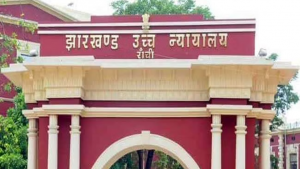 The Jharkhand High Court in the case of East India Udyog Ltd. vs, State of Jharkhand vide W.P.(T) NOS. 2853 TO 2855 OF 2023 dated 13.03.2024, has held that In the absence of adjudication proceedings, where the liability was disputed, the department couldn’t rightfully raise a demand for payment of interest on delayed filing of returns. Therefore, the impugned orders were set aside, indicating that the recovery proceeding without proper adjudication was not permissible. This case underscores the importance of following legal procedures and providing fair opportunities for both parties to present their arguments before reaching a decision.
The Jharkhand High Court in the case of East India Udyog Ltd. vs, State of Jharkhand vide W.P.(T) NOS. 2853 TO 2855 OF 2023 dated 13.03.2024, has held that In the absence of adjudication proceedings, where the liability was disputed, the department couldn’t rightfully raise a demand for payment of interest on delayed filing of returns. Therefore, the impugned orders were set aside, indicating that the recovery proceeding without proper adjudication was not permissible. This case underscores the importance of following legal procedures and providing fair opportunities for both parties to present their arguments before reaching a decision.
Facts of the Case: The Petitioner firm was engaged in business of manufacturing various types of power distribution transformers, conductors and cables. The Petitioner had made some delay in filing of the Return for the period from June 2018 to March 2019 but the Return could at last be filed within time as Notifications were issued on 31st December 2018, 24th June 2020 and 1st June 2021 extending the time for filing of the Return. Subsequently, the petitioner received a notice for payment of interest on the delayed filing of returns. Later, a show-cause notice under section 73 of the JGST Act was issued and, without affording any opportunity of hearing, Form GST DRC-07 was issued and demand of Rs. 92,96,042.91 under section 73 of the JGST Act was made without any adjudication.
The petitioner argued that interest cannot be levied without proper adjudication. Reliance was placed upon on judgments passed by coordinate Benches of this Court, to put forth a plea that the recovery proceeding under section 73 of the CJST Act cannot be initiated without a final adjudication.
However, the counsel for the department argued that once the petitioners admit default on its part and sta”tutory authorities deal with their plea, the court may not entertain the writ petition.
Held that:- The High Court noted that the issue arose because the demand for interest was made without affording the assessee firm an opportunity of hearing or initiating adjudication proceedings under sections 73 or 74 of the CGST Act 2017. The recovery proceedings under section 73 of the JGST Act were initiated without a final adjudication, which was deemed improper. It’s crucial in such cases that the department follows due process and provides an opportunity for the assessee to present their case before making a demand for payment.
In the absence of adjudication proceedings, where the liability was disputed, the department couldn’t rightfully raise a demand for payment of interest on delayed filing of returns. Therefore, the impugned orders were set aside, indicating that the recovery proceeding without proper adjudication was not permissible.
The Court referred to previous decisions and emphasized that without initiating adjudication proceedings under section 73 or 74 of the CGST Act 2017, where liability is disputed, the department cannot raise a demand for payment of interest on delayed filing of returns.
The relevant extract of the judgment in the case of ‘Mahadeo Construction Co. Vs. Union of India’ represents as under;
” A careful perusal of sub Sections (2) and (3) of Section 50 thus would show that though the liability to pay interest under section 50 is an automatic liability, still the quantification of such liability, certainly, cannot be by way of an unilateral action, more particularly, when the assessee disputes with regard to the period for which the tax alleged to have not been paid or quantum of tax allegedly remains unpaid. Likewise, whether an undue or excess claim of input tax credit or reduction in output tax liability was made, is also a question of fact which needs to be considered and decided after hearing the objections of the assessee, if any. Therefore, in my considered view, though the liability fastened on the assessee to pay interest is an automatic liability, quantification of such liability certainly needs an arithmetic exercise after considering the objections if any, raised by the assessee. It is to be noted that the term “automatic” does not mean or to be construed as excluding “the arithmetic exercise”. In other words, though liability to pay interest arises under section 50 of the said Act, it does not mean that fixing the quantum of such liability can be unilateral, especially, when the assessee disputes the quantum as well as the period of liability. Therefore, in my considered view, though the liability of interest under section 50 is automatic, quantification of such liability shall have to be made by doing the arithmetic exercise, after considering the objections of the assessee.”
To read the complete judgment 2024 Taxo.online 887


